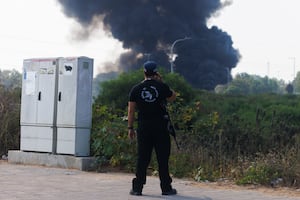When Prime Minister Benjamin Netanyahu gave the order to launch a massive attack against Iran last week, sparking an open-ended war between the arch enemies, many thousands of Israelis, Palestinians and other residents were left with next to no options to return home.
Ben Gurion Airport, a proud, ultra-high security symbol of Israel's resilience, was shut down indefinitely, so great is the risk from Iranian missile fire.
The national carrier El Al, whose planes are fitted with advanced air defence systems, spirited its planes off to airfields abroad. The airline is known for almost always flying, even when other carriers cancel for security reasons. Only at the worst moments since Hamas's October 7 attack on Israel in 2023 has it been forced to cancel or delay a handful of services.
While open at certain times, many land border crossings are unpredictable, in particular the Allenby Bridge, which links Jordan to the occupied West Bank, which itself is under draconian restrictions.

Only at the Eilat-Taba border crossing with Egypt, on a quiet and scenic corridor of land in the very south of Israel, have things been working almost as normal since the war began. The pocket of continuity is a testament to the oft-tested, still-enduring 1979 Egypt-Israel peace treaty.
Despite trepidation and official warnings, most people The National spoke with at Taba and Eilat on Monday seemed calm. After crossing into a modern Israeli terminal, the first thing to be seen was a photo of the former Egyptian president Anwar Sadat and former Israeli prime minister Menachem Begin shaking hands as the beaming US president Jimmy Carter looked on. It was the moment that heralded peace between two countries who for many decades had been bitter, warring enemies.
On the more ornate Egyptian side of the border, just after a line of hotel resorts, soldiers in white uniforms scanned bags and asked a trickle of passengers only a few questions about why they were travelling. A glimpse of an Israeli passport or work visa was enough to end any line of interrogation.
The most direct exercise of authority was a soldier, without asking, taking a piece of chewing gum from a traveller’s pile of pocket items left at the side of a metal detector, to smiles all round. Most of the conversations were held in Arabic, because most of the people crossing were Palestinians who hold Israeli passports.
Israelis have nonetheless been urged not to use crossings with Arab states. Israel's National Security Council has warned its citizens not to try to get home through Jordanian or Egyptian land crossings.

Moaz, an Egyptian taxi driver ferrying passengers to the crossing, said he did not understand the trepidation. “Israelis need to understand there are never any problems here,” he said. “The government is strong, the place is safe and people want to earn a living from travellers.”
As the sun rose over Sinai’s martian landscape, the bleak lack of Israeli tourism after October 7 became clear. Sharm El Sheikh, home to luxurious hotels and concert venues, and the world-famous diving hotspot Dahab further up the coast, seemed to be doing fine. But Nuweiba, where there are dozens of simple camps that used to be full of young Israelis, were completely abandoned.
At the Eilat-Taba crossing, the only non-Arab Israeli citizens The National saw were security and border staff. An officer checking passports on the Israeli side asked with some bemusement why people were crossing into a warzone at all. “I get it for Israelis and people like journalists, but we still get some regular visitors and I just don’t understand why they come,” she said.



